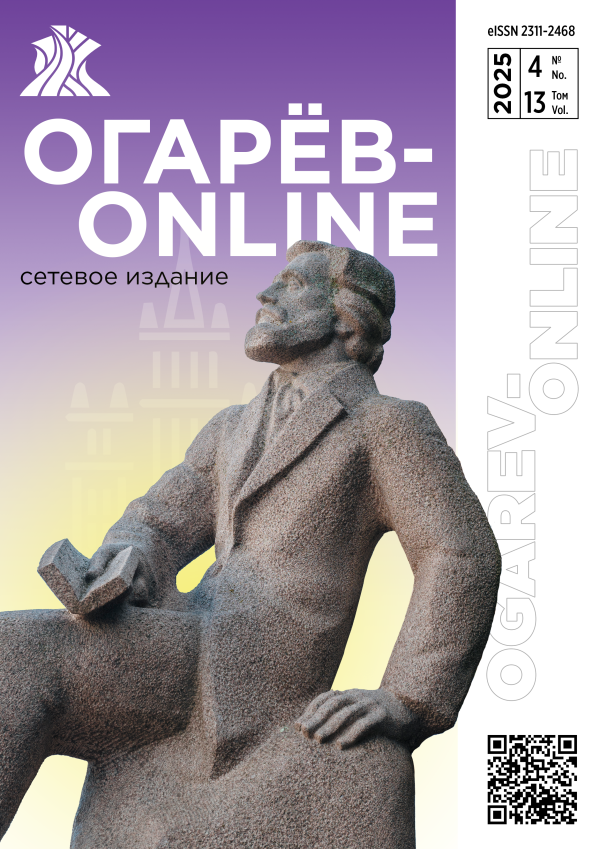Vol 12, No 3 (2024)
- Year: 2024
- Published: 01.03.2024
- Articles: 10
- URL: https://ogarev-online.ru/2311-2468/issue/view/16962
Full Issue
Language means of implementing compactness of English hashtag
Abstract
The article explores the phenomenon of text compactness in Internet communication. Considering the English hashtag, lexical means of implementing compactness, such as abbreviations, acronyms, initialisms and graphical shortenings, are identified. As a result of the study, it was found that abbreviation performs a number of functions in English hashtags.
 1-7
1-7


Structural and functional analysis of abbreviations in Spanish economic journals
Abstract
The article is devoted to the study of shortening as a productive way of word formation in the Spanish language. The analysis of structural and functional features of shortenings used in the texts of Spanish economic journals is presented. As a result, the most frequent types of shortenings are identified and the functions of shortenings in Spanish are considered.
 8-14
8-14


Strategies for rendering literary proper names from German into Russian
Abstract
This article describes and analyzes the functioning of proper names in German literary text. The proper names are systematized by the method of continuous sampling from the texts of fairy tales by the Brothers Grimm. The techniques for rendering proper names when translating the fairy tales under analysis from German into Russian are determined.
 15-20
15-20


Lacunae in translations of poetic text: a study of English translations of "Eugene Onegin" by A. S. Pushkin
Abstract
This article is aimed at studying the theory of lacunae in Russian and international research works. The authors identify lacunae in the text of the novel in verse "Eugene Onegin" by A. S. Pushkin in Russian and study the ways of rendering them into English.
 21-25
21-25


Imagery component of the concept HOUSE: a study based on English prose
Abstract
The article touches upon the issue of the concept structure. Various linguistic means of verbalization of the imagery component of the concept HOUSE are pointed out. The analysis is carried out using the texts of English prose. The authors come to the conclusion that anthropomorphic and mythological metaphors prevail in the representation of imagery component of the concept HOUSE in English literature.
 26-35
26-35


Graphic features of English fan fiction texts
Abstract
The article considers graphic features of fan faction texts written in English. The analysis English fan fiction texts based on Stephen King’s novel “It” shows frequently used graphic means. The functions of graphic means in the fan fiction texts under analysis are defined.
 36-41
36-41


Stylistic means of comic effect in Vladimir Kaminer's prose
Abstract
The article considers stylistic and language means of conveying humor and achieving the comic effect in the prose work “Russendisko” by V. Kaminer. The focus of the study is on the German language used in creative writing which is analyzed from the point of view of achieving the comic effect.
 42-48
42-48


Principles of studying communication strategies of producer and recipient in media discourse
Abstract
The article describes the principles of the communicative strategies of the producer and recipient which are necessary for their study in modern media discourse. The purpose of the study is to identify the most relevant principles of the communication strategy to determine its concept, structure, and position in a speech act.
 49-54
49-54


Syntactic compression in small format texts: a study of French jokes
Abstract
The article provides an analysis of syntactic compression in small format texts. The material of the study includes French jokes. The study showed that a joke as a small-format text widely uses sentences with an incomplete predicate in the first and second lines of the dialogue. The predicate can be easily restored and its omission plays a role in creating the comic effect.
 55-59
55-59


Verbalization of privacy in English business memoir
Abstract
The article considers the language means of realization of privacy in the English business memoir. The linguistic analysis of the memoir of Richard Branson, the British businessman, and the memoir of Phil Knight, the US entrepreneur, has shown that proper names of certain types is the common lexical means of privacy verbalization.
 60-65
60-65
















